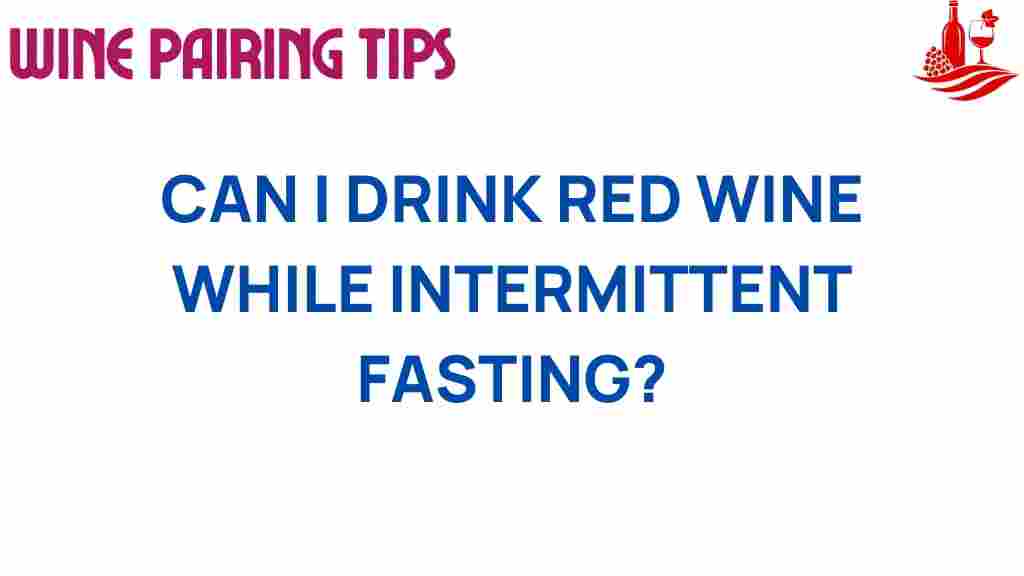The Surprising Truth About Red Wine and Intermittent Fasting
Intermittent fasting has surged in popularity as a flexible and effective approach to weight loss and wellness. Alongside this trend, red wine, known for its rich flavor and potential health benefits, often sparks discussion. But how do these two seemingly opposite lifestyles coexist? Can red wine be included in an intermittent fasting regimen? In this article, we’ll explore the intricate relationship between red wine, intermittent fasting, and their combined effects on health and nutrition.
Understanding Intermittent Fasting
Intermittent fasting (IF) is not a diet in the traditional sense but rather an eating pattern. It alternates between periods of eating and fasting, allowing the body to switch from burning glucose to burning fat as its primary source of energy. Here’s a brief overview of the most common methods:
- 16/8 Method: Fast for 16 hours and eat during an 8-hour window.
- 5:2 Diet: Eat normally for five days and restrict calories to about 500-600 on two non-consecutive days.
- Eat-Stop-Eat: Involves fasting for 24 hours once or twice a week.
- Alternate-Day Fasting: Alternating days of normal eating with days of fasting.
Each method has its unique benefits, and the choice often depends on individual preferences and lifestyles. But how does red wine fit into this framework?
The Health Benefits of Red Wine
Red wine has long been celebrated for its potential health benefits, primarily attributed to its antioxidant properties, specifically resveratrol. Here are some key health benefits associated with moderate red wine consumption:
- Heart Health: Moderate consumption is linked to a lower risk of heart disease.
- Improved Longevity: Studies suggest that components in red wine may contribute to a longer lifespan.
- Brain Health: Resveratrol may enhance cognitive function and protect against neurodegenerative diseases.
- Blood Sugar Control: Red wine can help improve insulin sensitivity.
These benefits highlight why many consider red wine a worthy addition to their diet, particularly during intermittent fasting. However, moderation is crucial; excessive alcohol consumption can negate these benefits and lead to various health issues.
Red Wine and Intermittent Fasting: The Compatibility
When it comes to intermittent fasting, the question arises: can you enjoy red wine during your eating window? The answer is yes, but with caution. Here’s how to integrate red wine into your intermittent fasting lifestyle:
- Choose Quality Over Quantity: Opt for high-quality red wines with lower sugar content.
- Timing is Key: Enjoy your wine during your eating window to avoid breaking your fast.
- Mind Your Portions: Stick to one or two glasses to reap the benefits without overdoing it.
Incorporating red wine into your diet while practicing intermittent fasting can be a delightful experience, provided you adhere to these tips.
Nutritional Considerations
Understanding the nutritional content of red wine is essential when considering it in your intermittent fasting plan. Here are some key points to consider:
- Caloric Content: A standard 5 oz serving of red wine contains approximately 125 calories.
- Carbohydrates: Red wine generally has about 3-4 grams of carbohydrates, which may impact your fasting goals.
- Alcohol and Metabolism: Alcohol can slow down fat oxidation, so it’s important to consume it mindfully.
Being aware of these nutritional details can help you make informed choices about when and how to enjoy red wine while fasting.
Fasting Tips for Enjoying Red Wine
If you’re keen on enjoying red wine while practicing intermittent fasting, here are some practical tips:
- Stay Hydrated: Drink plenty of water throughout the day to stay hydrated, especially if you consume alcohol.
- Pair Wisely: Enjoy red wine with healthy meals rich in fiber and protein to enhance satiety.
- Listen to Your Body: Pay attention to how your body responds to alcohol during your fasting periods.
These tips can ensure that your experience with red wine remains enjoyable and beneficial while adhering to your intermittent fasting regimen.
Potential Pitfalls of Combining Red Wine and Intermittent Fasting
While there are benefits to enjoying red wine during your eating window, it’s essential to also be aware of potential pitfalls:
- Overconsumption: It can be easy to exceed moderation during social occasions.
- Emotional Eating: Some may turn to wine during fasting periods as a coping mechanism.
- Impact on Sleep: Alcohol can disrupt sleep patterns, which are crucial for weight loss and overall wellness.
Being mindful of these pitfalls can help you maintain a balanced approach to your fasting and wine consumption.
Conclusion
In summary, the relationship between red wine and intermittent fasting is nuanced yet promising. When consumed mindfully during your eating window, red wine can offer various health benefits without derailing your fasting efforts. Remember to focus on quality, moderation, and timing to maximize the advantages while minimizing the risks.
As always, it’s essential to listen to your body and consult with a healthcare provider if you have any health concerns or specific dietary needs. Incorporating red wine into your intermittent fasting lifestyle can be a delightful experience if done thoughtfully.
For more tips on nutrition and wellness, check out our comprehensive guide on healthy eating.
Embrace the journey of intermittent fasting and enjoy red wine responsibly as part of your health and wellness routine.
This article is in the category Tips and created by Wine Pairing Tips Team
